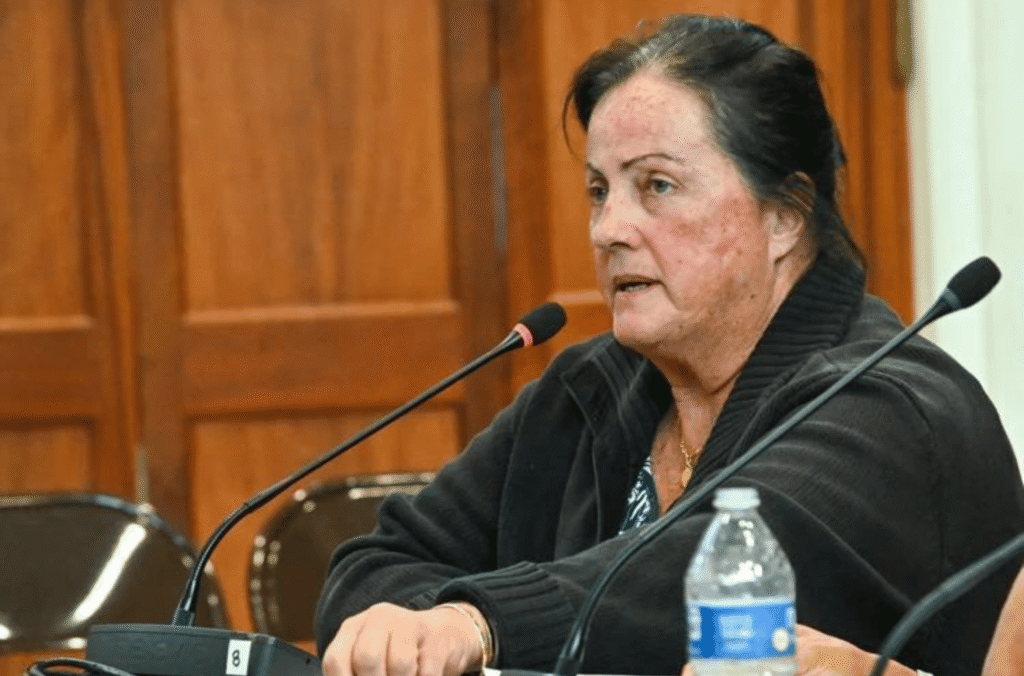HAGÅTÑA (The Guam Daily Post) — Some elements of support were sprinkled among voices of opposition Wednesday, as lawmakers heard testimony on two bills focused on expanding and protecting abortion access on Guam.
While several individuals participated in the hearing, which lasted about two hours, the overall hearing stood in stark contrast to the significant public participation that the failed Guam Heartbeat Act garnered more than a year ago.
But unlike the Guam Heartbeat Act, which essentially would have imposed a six-week ban on abortions, Bills 106-37 and 111-37 would implement additional protections and prohibit various restrictions on abortion through a series of provisions called the Health Protection Act of 2023.
Under this act, health care providers and their patients would have the statutory right to provide and receive abortion services. This would include barring prohibitions at any time before fetal viability, including any prohibition on a particular abortion procedure.
Viability is defined in the act as the point in a pregnancy at which, based on the good-faith medical judgment of a health care provider and the facts before that provider, there is a reasonable likelihood of sustained fetal survivability outside the uterus, with or without artificial support.
The Health Protection Act would allow abortions after viability when continuation of the pregnancy would pose a risk to the patient’s life or health.
The difference between the bills is how the Health Protection Act would be implemented.
Bill 106, sponsored by Sen. Thomas Fisher and Vice Speaker Tina Muña Barnes, would allow voters to decide if the act should be adopted. Bill 111, introduced by Sen. William Parkinson, would enact the Health Protection Act like most other laws, without having the population vote.
Some opposed to these bills noted that abortion is legal on Guam, and it would remain legal even if the Health Protection Act is rejected. However, there continues to be a ban written in law, Public Law 20-134, that imposes harsh restrictions on abortion with limited exceptions related to medical intervention and ectopic pregnancies. With Guam said to have the second-highest number of rapes per capita in the United States, some of the discussion around prohibitions to abortion have revolved around how they treat victims of sexual assault.
Neither P.L. 20-134 nor the Guam Heartbeat Act make exceptions for victims of rape or incest, unless they already fit within the limited exceptions outlined in those measures. The Guam Heartbeat Act passed the Guam Legislature last term, but was vetoed by Gov. Lou Leon Guerrero.
P.L. 20-134 was placed under a permanent injunction, as it was held unconstitutional shortly after enactment about 30 years ago, but it was never explicitly repealed.
Now that the U.S. Supreme Court has reversed course on abortion rights, stating in Dobbs v. Jackson Women’s Health Organization that there is no guarantee to abortion in the Constitution, Attorney General Douglas Moylan is attempting to revive the old ban through the federal courts.
There are existing mandates for abortion, such as the in-person consultation requirement, that may limit a person’s ability to seek an abortion. The Health Protection Act would appear to do away with some of those requirements.
Most of the testimony Wednesday, including written letters, opposed Bills 106 and 111, but the measures did receive some support.
Tatiana Reyes supported Bill 111, but opposed Bill 106.
“The power to decide on reproductive rights is an issue about the fundamental human right to bodily autonomy and equitable health care. Putting these rights in the hands of voters is an irresponsible act. Access to these human rights should not be dependent on the votes of the majority, votes that realistically are susceptible to be guided by a limited understanding of an extremely nuanced issue and personal values that should only dictate the life choices of the individual that holds them,” Reyes said.
The Guam Medical Society also supported Bill 111, but did not mention Bill 106.
“The Guam Medical Society maintains that a woman has the right to make decisions about her reproductive choices after understanding her options and the risks/benefits associated with those options. The Guam Medical Society will always advocate against interference in shared medical decision-making,” GMS President Dr. Samir Ambrale stated in written testimony.
Fisher stated earlier in the hearing that the point of Bill 106 is to put the question of abortion before the public, as he felt it provided a firmer basis for a fundamental right to abortion as a matter of privacy, in light of the Dobbs decision. He noted that subsequent Guam Legislatures could outlaw and criminalize abortions, but they would be reluctant if abortion rights were endorsed by the public.
Addressing Reyes later in the hearing, Fisher said he understood her position, but said Bill 106 is an attempt to build an “imperfect” backstop to protecting reproductive rights. Reyes said her concern was that the voting population is so vast, and she doesn’t expect people will devote the time to become well informed or to think about the community as a whole, rather than their own self interest.
“I might feel more confident knowing that the senators do their own research, … make a well-informed decision, and as public servants, put aside any personal, cultural or religious values that may affect this decision,” Reyes said.
Jayne Flores, director of the Bureau of Women’s Affairs, said the bureau supported the intent of Bill 106, but asked lawmakers to consider that the Health Protection Act may be too lengthy to put forth in a “yes” or “no” vote for the public. Bill 111 would accomplish the same as Bill 106, but in a more straightforward manner, according to Flores.
Flores’ testimony earned criticism from Sen. Telo Taitague, an incumbent senator who supported the Guam Heartbeat Act.
“As a director of the women’s bureau, I’m not sure why you’re here testifying at all on any of these bills that you should have a neutral position … because you represent all the women on Guam,” Taitague said, earning applause from some in the public hearing room.
“I’m just really disappointed, Jayne Flores, that you’re doing that. I wouldn’t say anything if you came here on your own personal time to come and testify in favor of murdering babies, … in fact, you have your right. But, you’re a director paid with taxpaying money for something so controversial as this. You are not representing all the women on this island, that’s for sure,” Taitague added.
Flores would later say that she was invited to testify by the legislative health committee chair, and as a member of the governor’s administration, she advocates the administration’s position that abortion is “a personal, private health care decision.” Taitague responded that Flores could have declined the invitation.
Taitague also addressed Reyes, stating that Reyes mentioned earlier that she didn’t believe the people of Guam “knew very much.” Reyes immediately interjected that that wasn’t what she said.
“I said that because abortion and reproductive rights is such a nuanced issue, there are tons of different studies and facts about it. I do not believe that every individual voter will have the means or the time to be well roundly informed about the issue,” Reyes said.
Taitague said she disagreed, particularly on a vote as important as one on abortion.
Reyes asked if she could respond, and there was a brief moment of tension between Taitague and Fisher when the latter asked Speaker Therese Terlaje if she would allow Reyes to talk. Terlaje said Taitague had the floor, and the latter moved on without letting Reyes speak more.
The opposition testimony to the bills brought up concerns that the language within the Health Protection Act was vague or misleading. There were also concerns over when an abortion can be performed and concerns with a lack of reporting requirements. Some also cited or implied religious reasons for their opposition.
The Health Protection Act defines health care provider as any entity or individual (including any physician, certified nurse-midwife, nurse practitioner, and physician assistant) who is engaged or seeks to engage in the delivery of health care services, including abortion, and if required by law or regulation to be licensed or certified to engage in the delivery of such services, is licensed or certified, or would be so licensed or certified “but for their past, present or potential provision of abortion services” permitted by section 4 of the act.
There were concerns among the opposition that this definition opens the door for “anyone” to provide abortion services or determine fetal viability, to which Fisher pointed out the licensing requirements.
Another concern was over the enforcement provision of the Health Protection Act, which allows the attorney general to commence a civil action against any government official charged with implementing or enforcing any limitation or requirement that would violate the act.
The act would also allow any individual or entity, including any health care provider, aggrieved by an alleged violation of the act, to pursue civil action against government officials charged with implementing or enforcing requirements in violation of the act.
Sharon O’Mallan said the enforcement section felt “like an actual threat,” intended to “bully and intimidating anyone who is pro-life.” She also brought up the provision on other limitations or requirements, which outline how a court can determine if a limitation or requirement impeded access to abortion.
From her testimony, it appears that O’Mallan interpreted these provisions as allowing lawsuits against anyone who may be “considered as having prohibited an abortion or having caused a delay in a woman considering an abortion.”
“So, should a person decide to stand outside an abortion clinic or in front of a legislative building or outside in the general public and display pro-life signs or ‘Pray to end Abortion’ signs, these people may be considered as possible reasons for a person to change their mind about having their abortion or may possibly delay a person from having an abortion. So the person who either changes their mind about their abortion, or delays in getting their abortion, can then blame the pro-life person as the cause and then can take that person to civil court and sue them for the delay. This is incredible,” O’Mallan stated.
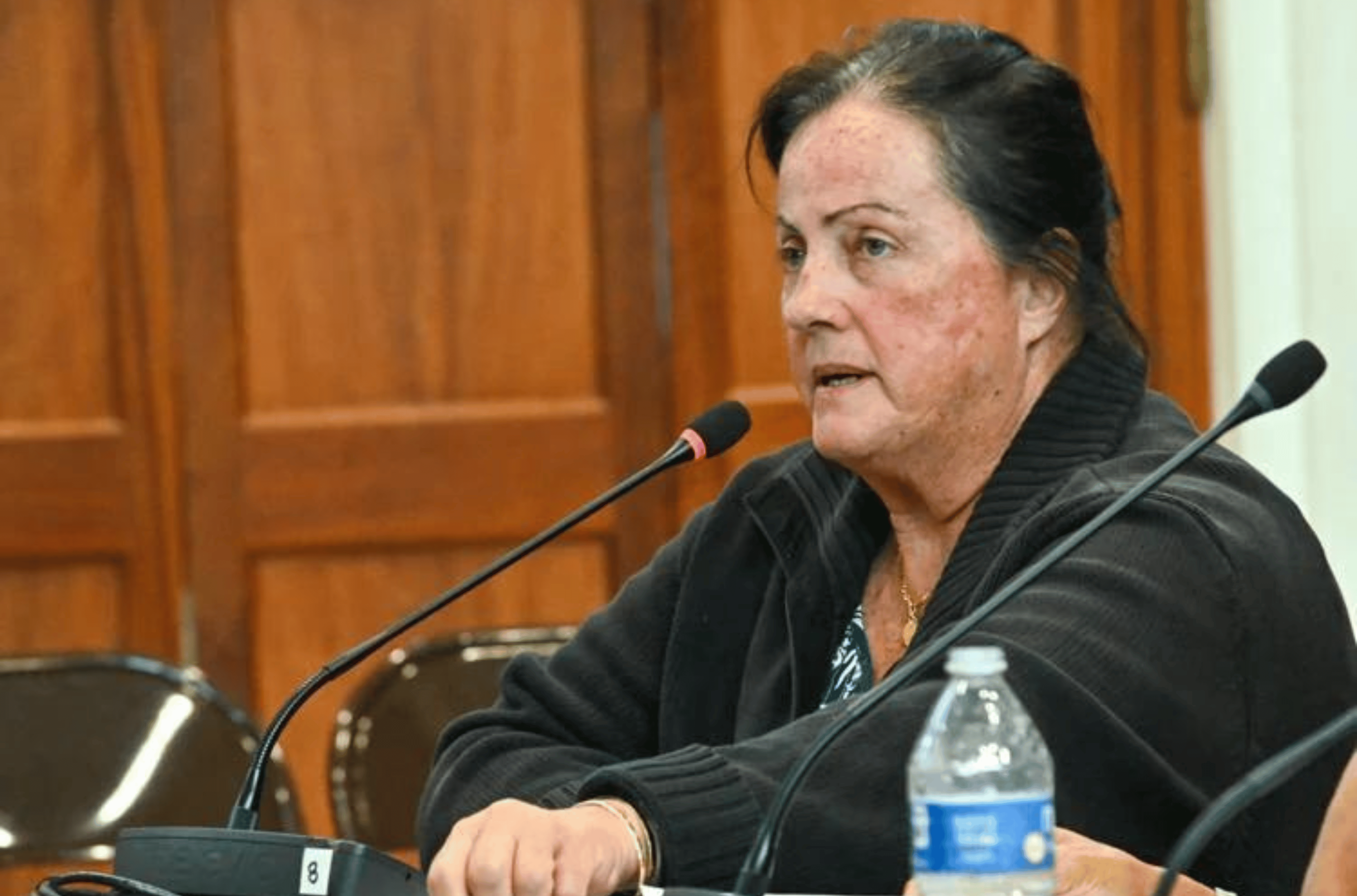
Sharon O’Mallan testifies against Bill 106-37(LS) and Bill 111-37(LS) during public hearings Wednesday, Sept. 13, 2023, at the Guam Congress Building in Hagåtña.
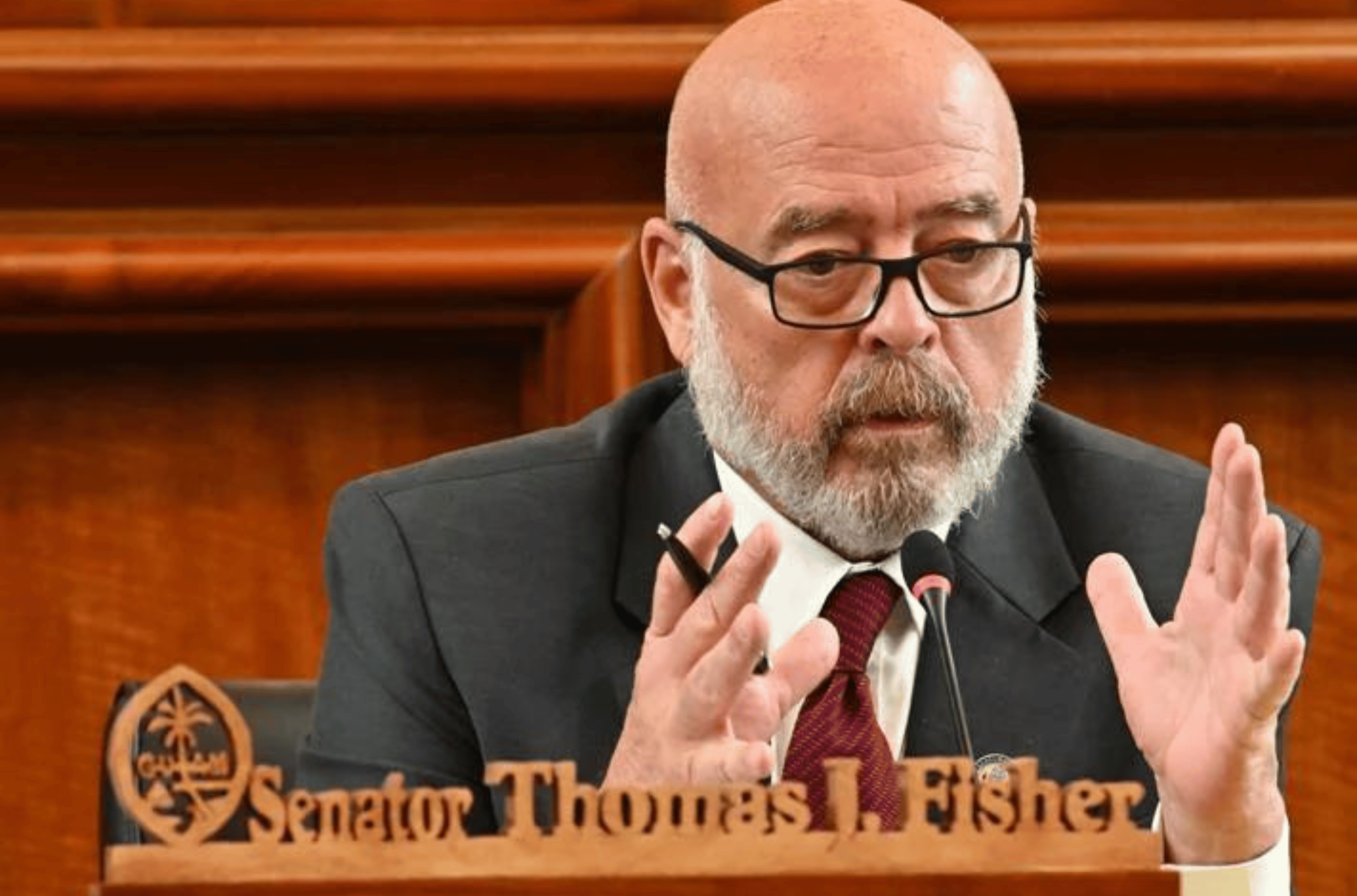
Sen. Thomas J. Fisher, introduces Bill 106-37(LS) during public hearings Wednesday Sept. 13, 2023, at the Guam Congress Building in Hagåtña.
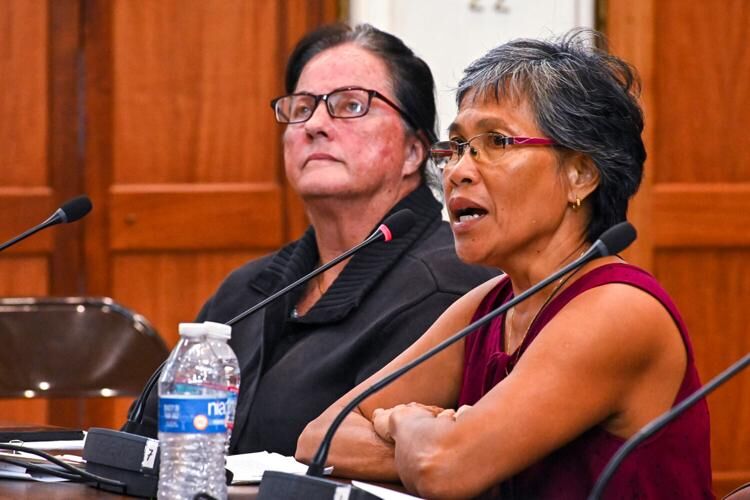
Agnes White, right, testifies against Bill 106-37(LS) and Bill 111-37(LS) during public hearings Wednesday, Sept. 13, 2023, at the Guam Congress Building in Hagåtña.
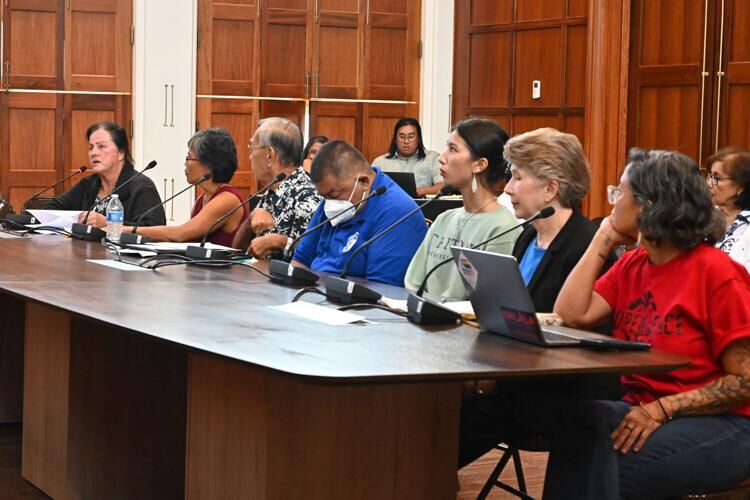
People testify on Bill 106-37(LS) and Bill 111-37(LS) during public hearings Wednesday, Sept. 13, 2023, at the Guam Congress Building in Hagåtña.










